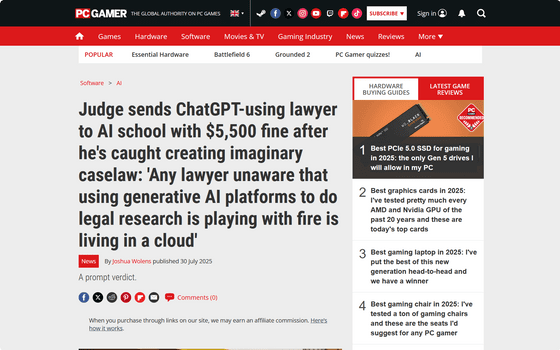Lawyer fined $5,500 for using AI to generate non-existent legal precedents, told he needs more education

A lawyer who cited an AI-generated precedent in a court case was fined $5,500. The judge ordered the lawyer to reflect on his actions and receive educational guidance.
InreMartin.pdf
(PDF file)
Judge sends ChatGPT-using lawyer to AI school with $5,500 fine after he's caught creating imaginary caselaw: 'Any lawyer unaware that using generative AI platforms to do legal research is playing with fire is living in a cloud' | PC Gamer
https://www.pcgamer.com/software/ai/judge-sends-hangdog-lawyer-to-ai-school-after-hes-caught-using-chatgpt-to-cite-imaginary-caselaw-any-lawyer-unaware-that-using-generative-ai-platforms-to-do-legal-research-is-playing-with-fire-is-living-in-a-cloud/

Thomas Neal, an attorney at Semrad Law Firm who had been handling the client's bankruptcy proceedings since 2024, prepared a repayment plan for the creditor, Corona Investors, but Corona Investors did not accept it and challenged the feasibility of the repayment plan.
Neal countered that Corona Investors had no standing to challenge the repayment plan, citing four court cases as evidence.
However, when Judge Michael Slade, who presided over this case, carefully examined the precedents, he found that there were problems with all four cases. The problems with each were as follows:
Montoya: Not only are the words cited by the attorneys never found in the actual court record, but the record makes no mention of the issue of competency at all.
Coleman Case: This case was in a different state and also lacked the cited text and did not mention qualifications.
Russell case: Different state has jurisdiction and there is no record of the cited text
Jaguar Incident: This incident does not exist
Judge Slade was puzzled by the fact that all four cases were unrelated, and asked Neal why, to which Neal admitted that he had used ChatGPT.

'These citations of cases were probably... we ran them through AI to some extent, but we didn't think they were incorrect,' Neal said. 'We've never used AI in this way before. We didn't scrutinize the data it provided because we didn't think it would be something that would fabricate cases.'
In response to Judge Slade's complaint, Neal promised to 'review all AI work when using AI for legal research' and stated that he had reported himself to the Illinois Attorney Registration and Disciplinary Commission. Semrad Law Firm also assured that 'the use of AI for legal research or citation generation without human review is strictly prohibited.'

Neal and the Semrad Law Firm asked for no sanctions, stating that they had 'voluntarily admitted to their improper conduct, promised not to recur, withdrawn their claim for damages in this case, and completed a Comprehensive Legal Education (CLE) program.' However, Judge Slade stated, 'I commend their honesty and efforts, but they must pay a reasonable price,' and ordered Neal and the others to pay a $5,500 sanction.
In imposing the sanctions, Judge Slade cited two reasons: 'If they could not allocate sufficient resources to all of their clients, they should have delegated some of the work to other law firms and not relied on generative AI.' He also said: 'Mr. Neal claims he was unaware of the risks of AI, but in recent years, lawyers who are unaware of the risks of AI are ignorant of reality. This issue has been a hot topic in the legal profession since at least 2023.'
'I consider this a moderate sanction, and I warn that any attorney who does the same thing again may face more serious penalties,' Judge Slade wrote. 'Fortunately, the National Conference of Bankruptcy Judges will soon be holding a plenary session entitled 'The Promises and Perils of Artificial Intelligence.' I hereby order that Attorney Neal and the senior attorneys at Semrad Law Firm attend that session in person.'
Related Posts:
in Posted by log1p_kr







